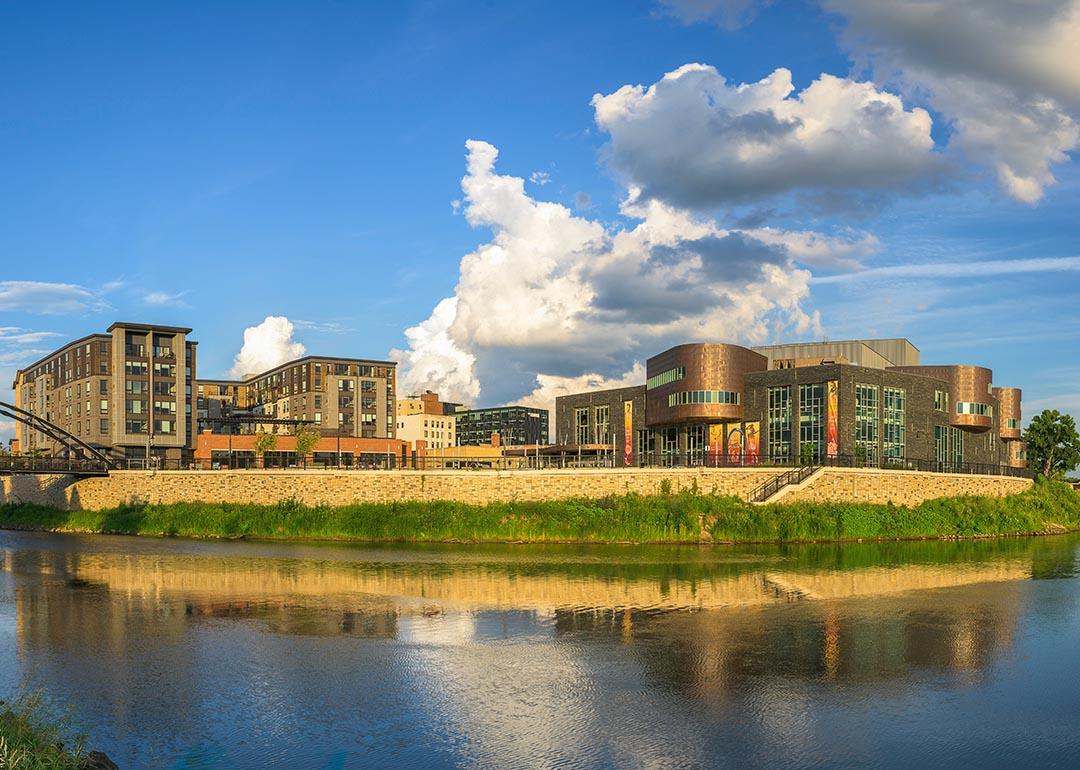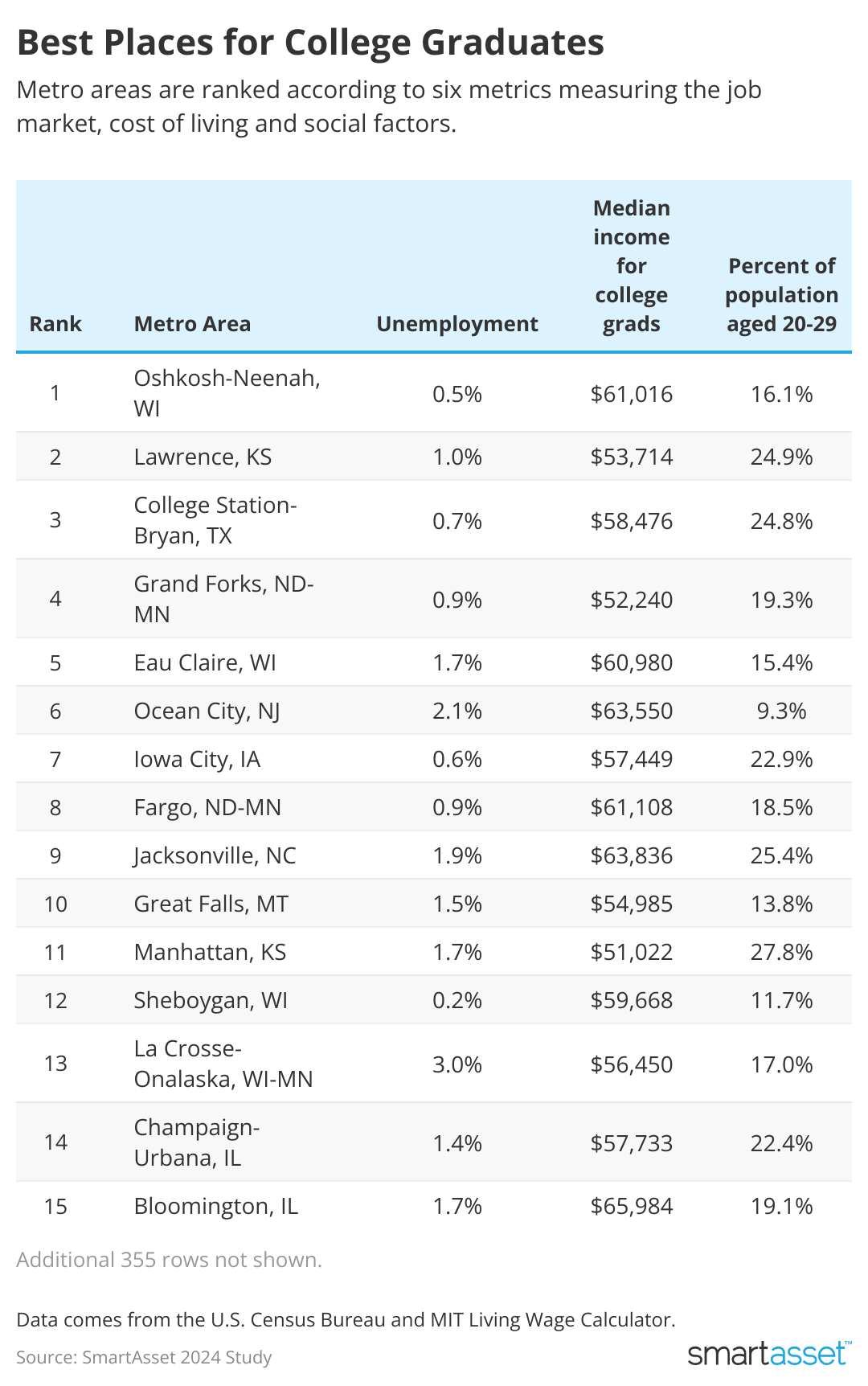
Which U.S. cities are best for new college graduates?
This story was produced by SmartAsset and reviewed and distributed by Stacker Media.
Which U.S. cities are best for new college graduates?
As we enter commencement season, college graduates will be seeking a variety of jobs and lifestyles. Therefore different areas are going to cater more to some than others. For example, one graduate may highly value living in a younger community with plenty of recreational activities to dabble in, while others are focused on career growth and earning as much as possible out of the gate.
With this in mind, SmartAsset set out to determine the best overall places for new college graduates, ranking 370 metro areas based on metrics for the job market, costs and social aspects.
Key findings
- The best place for college graduates is in Wisconsin. The Oshkosh-Neenah metro area ranks first in part due to a particularly low unemployment rate of 0.5% and relatively low cost of living at $32,760 annually for basic necessities and taxes for a single adult. Socially, 16.1% of residents are in their 20s, and there are plenty of bars. The Eau Claire, WI metro area also makes the top 10, with similar metrics and a 1.7% unemployment rate.
- College graduates earn the highest incomes near the Bay Area and Washington D.C. While the high costs in these areas present some risks for fresh college graduates who have yet to secure a job, the highest income potential for graduates is in the metro areas of San Jose ($102,478), San Francisco ($99,685), California-Lexington Park, MD ($92,170), Napa ($85,698) and DC-Arlington-Alexandria ($85,145).
- Jackson, TN has the lowest cost of living and very low unemployment. For a single adult with no kids to support themselves with necessities, it'd only take a pre-tax salary of $27,955, compared to the average $51,630 income here for college graduates. The unemployment rate is only 0.2%, eighth-best studywide. But the area ranks lower for social factors, with a low rate of people in their 20s (13.0%) and relatively few venues for food, drinking and entertainment.
- One quarter or more of the population is in their 20s in these metro areas. The Manhattan, KS area has the most people between the ages of 20 and 29 at 27.8%. For the Jacksonville, NC metro, that figure is 25.4%. Lawrence, KS metro (24.9%) and the College Station-Bryan, TX area (24.8%) have similarly high rates of people in their 20s.
- The Ocean City, NJ metro is best for college grads looking for things to do. The Ocean City, NJ metro, which ranked sixth overall for college grads, has the most restaurants per capita and is second only to Los Angeles when it comes to entertainment venues.

Top 10 places for new college graduates
- Oshkosh-Neenah, WI Metro
- Unemployment rate: 0.5%
- Income for bachelor's degree holders: $61,016
- Basic costs for a single adult: $32,760
- Residents aged 20-29: 16.1%
- Restaurants per capita: 0.00144
- Bars per capita: 0.00050
- Entertainment venues per capita: 0.00049
- Lawrence, KS Metro
- Unemployment rate: 1.0%
- Income for bachelor's degree holders: $53,714
- Basic costs for a single adult: $33,363
- Residents aged 20-29: 24.9%
- Restaurants per capita: 0.00195
- Bars per capita: 0.00026
- Entertainment venues per capita: 0.00038
- College Station-Bryan, TX Metro
- Unemployment rate: 0.7%
- Income for bachelor's degree holders: $58,476
- Basic costs for a single adult: $32,968
- Residents aged 20-29: 24.8%
- Restaurants per capita: 0.00160
- Bars per capita: 0.00013
- Entertainment venues per capita: 0.00032
- Grand Forks, ND-MN Metro
- Unemployment rate: 0.9%
- Income for bachelor's degree holders: $52,240
- Basic costs for a single adult: $31,138
- Residents aged 20-29: 19.3%
- Restaurants per capita: 0.00159
- Bars per capita: 0.00038
- Entertainment venues per capita: 0.00059
- Eau Claire, WI Metro
- Unemployment rate: 1.7%
- Income for bachelor's degree holders: $60,980
- Basic costs for a single adult: $31,595
- Residents aged 20-29: 15.4%
- Restaurants per capita: 0.00164
- Bars per capita: 0.00056
- Entertainment venues per capita: 0.00050
- Ocean City, NJ Metro
- Unemployment rate: 2.1%
- Income for bachelor's degree holders: $63,550
- Basic costs for a single adult: $36,150
- Residents aged 20-29: 9.3%
- Restaurants per capita: 0.00638
- Bars per capita: 0.00021
- Entertainment venues per capita: 0.00145
- Iowa City, IA Metro
- Unemployment rate: 0.6%
- Income for bachelor's degree holders: $57,449
- Basic costs for a single adult: $34,549
- Residents aged 20-29: 22.9%
- Restaurants per capita: 0.00196
- Bars per capita: 0.00020
- Entertainment venues per capita: 0.00046
- Fargo, ND-MN Metro
- Unemployment rate: 0.9%
- Income for bachelor's degree holders: $61,108
- Basic costs for a single adult: $31,013
- Residents aged 20-29: 18.5%
- Restaurants per capita: 0.00152
- Bars per capita: 0.00024
- Entertainment venues per capita: 0.00057
- Jacksonville, NC Metro
- Unemployment rate: 1.9%
- Income for bachelor's degree holders: $63,836
- Basic costs for a single adult: $32,032
- Residents aged 20-29: 25.4%
- Restaurants per capita: 0.00151
- Bars per capita: 0.00013
- Entertainment venues per capita: 0.00023
- Great Falls, MT Metro
- Unemployment rate: 1.5%
- Income for bachelor's degree holders: $54,985
- Basic costs for a single adult: $32,510
- Residents aged 20-29: 13.8%
- Restaurants per capita: 0.00182
- Bars per capita: 0.00047
- Entertainment venues per capita: 0.00106
Data and methodology
To evaluate overall rankings, we broke our metrics down into three subcategories: Jobs, Affordability and Social, and applied them to 370 metro areas for which data was available.
Jobs defines the career opportunities and stability within a local economy, and consists of:
- Unemployment: Unemployment data is for people aged 25-64 that hold a bachelor's degree or higher. Data is sourced from the U.S. Census Bureau 2022 1-Year American Community Survey.
- Income: This is the median earnings of bachelor's degree holders aged 25 or older. Data is sourced from the U.S. Census Bureau 2022 1-Year American Community Survey.
Affordability evaluates the costs of living in a particular metro area. This data comes from MIT's Living Wage Calculator for 2023 and incorporates the costs of housing, food, medical care, transportation and other miscellaneous necessities.
Social measures local demographic and business metrics to evaluate general social potential and includes:
- Population aged 20-29: This measures the percentage of the population that falls between age 20 and 29. Data comes from the U.S. Census Bureau 2022 1-Year American Community Survey.
The following social metrics were given half-weightings relative to other metrics:
- Restaurants: This is the number of restaurants per capita. Restaurant data comes from the County Business Patterns 2021 Survey from the U.S. Census Bureau.
- Bars: The number of bars per capita. Data comes from the County Business Patterns 2020 Survey from the U.S. Census Bureau.
- Entertainment venues: The number of entertainment venues per capita, sourced from the County Business Patterns 2020 Survey form the U.S. Census Bureau.



